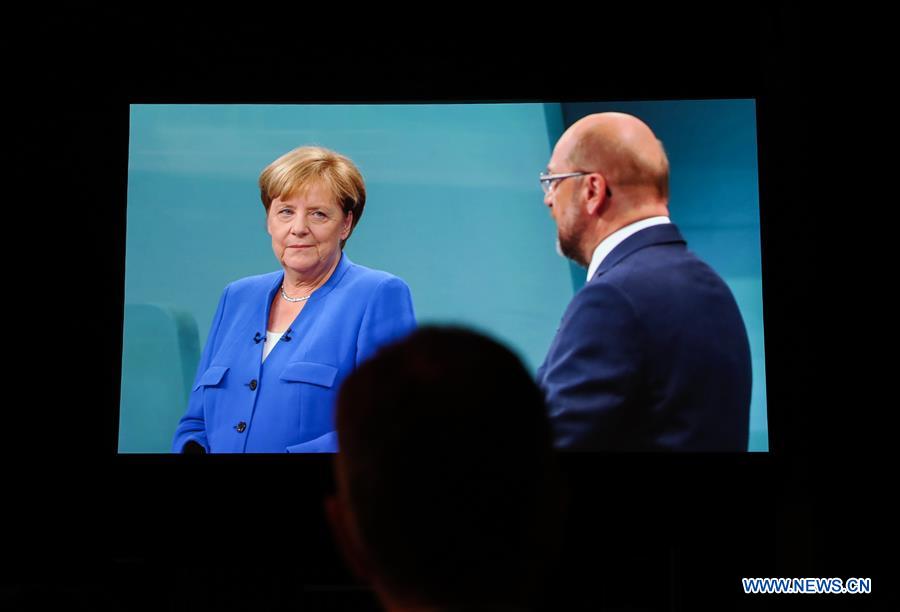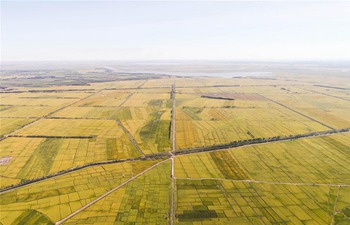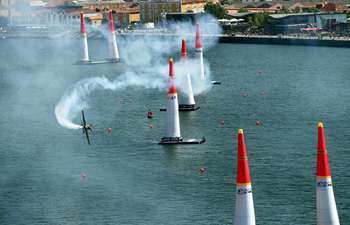by Burak Akinci
ANKARA, Sept. 5 (Xinhua) -- Ailing bilateral relations between NATO members Turkey and Germany have taken another heavy blow and are bound to spill over to the European Union, where German Chancellor Angela Merkel will seek to suspend or end Ankara's arduous membership bid, a move which can ultimately prove costly for Berlin, analysts said.
Merkel appeared to have sharpened her rhetoric on Turkey during Sunday's debate when her challenger Social Democrat (SDP) leader Martin Schulz vowed to stop Ankara's bid to join the European Union if he were elected chancellor.
Merkel, who has been at odds with Turkish President Recep Tayyip Erdogan on many issues since last year, said "the fact is clear that Turkey should not become a member of the EU."
The chancellor put her words into practice on Tuesday, by announcing that she'll bring up the future of Turkey's accession bid with fellow EU leaders during their next month's summit, raising the prospect of a formal end to Ankara's membership aspirations.
"I will recommend that we discuss the future status of Turkey, including whether to suspend or end talks," Merkel said in a speech to lower-house lawmakers in Berlin, causing a drop in the Turkish lira and bonds in the financial markets.
"In the short term Turkey can lose this dispute, but in the long term it will prove costly for Germany," said Huseyin Bagci, professor of international relations at Middle East Technical University (METU).
"Ultimately Turkey will watch Germany's powers being tested inside the EU," where central and eastern European countries are hostile to Berlin's ever growing influence.
Also, if Turkey decided to open the floodgates on his own accord toward Europe and not abide by a controversial agreement concluded in 2016 after a mass inflow of Syrian refugees, it could damage European solidarity with Merkel, as the eastern countries will be the first concerned by a new crisis.
"What we are witnessing is a geopolitical and geoeconomic uprising of Turkey. Let us not forget despite all criticism a regional player being a member of the G20, NATO and the Islamic Organization conference," Bagci said.
"The path taken by Merkel is a mistake but Erdogan, for his part, is also taking a big risk," he noted.
Erdogan's spokesman Ibrahim Kalin accused Monday Germany of "indulgence in populism."
"It is certainly not a coincidence that our president was the main topic of the debate," he said on his twitter account, implying that German lawmakers were diverting attention to Turkey from other political questions.
Turkish Foreign Ministry also issued an official stance against Austria, highlighting "unacceptable election campaigns of politicians in both countries against Turkey."
"We are very unhappy with the disgraceful campaigning of political leaders in Germany and Austria, with a focus on opposing Turkey and blocking its negotiations process with the EU," the ministry said in a statement.
Turkey has arrested some 50,000 people following the failed coup in July 2016. At least 55 are known to hold German citizenship, among whom is a German journalist imprisoned on terror charges.
Relations between Ankara and Berlin have sharply deteriorated since the Turkish government's crackdown against followers of the U.S.-based preacher Fethullah Gulen and his shadowy network of businesses and charitable organizations.
Ankara accuses Gulen of being behind the plot that killed nearly 250 people and wounded 2,000 others.
Turkey also accuses Germany of acting as a safe haven for militants from the Kurdistan Workers' Party (PKK) and Gulen followers.
In recent months, President Erdogan has repeatedly referred to Germany's Nazi past, saying the country, where there is a big Turkish diaspora of some 3 million people, is becoming "racist."
Erdogan has not forgotten that neither Germany nor other EU countries made any response for weeks after the coup while Russian President Vladimir Putin was the first leader to offer sympathy, noted Bagci.
In months, a series of differences, which seemed benign at first, transformed "Merkel, the leader who advocated the most for Turkey inside the EU, to somewhat of an enemy number one," he added.
Germany refuses to extradite dozens of suspected coup plotters seeking asylum in the country and accuses Ankara of silencing all forms of dissent, while Turkey argues that the state of emergency and the subsequent crackdown are a must to free the state of terrorist elements.
"The notions of justice for the two countries are different and incompatible, but Germany has to renounce her attitude of lesson given to other countries and try to understand and take concrete steps toward Turkey's requests" of extradition, said Bagci.
Turkey joined a customs union with European countries and began difficult negotiations to became a member of the EU in 2005, but the discussions didn't advance very far and has stalled for months, with several EU countries reluctant to grant citizenship to the 80 million Muslim Turks.
Turkey's image as a secular and democratic country has sharply deteriorated in Europe in recent years and Erdogan has been accused of authoritarian rule, especially after the narrow win in a April contested constitutional referendum granting him sweeping executive powers.
In response to the mounting speculation among member states, the High Representative for Foreign Policy and Security Federica Mogherini said "Turkey continues to be a candidate for EU membership," despite her acknowledgment that there were problems in relations.
"At the point, all political parties in Germany, whether they are from the right or the left wing, are hostile to a progress in Turkey's accession bid to the EU," Professor Birgul Demirtas from political sciences and foreign relations department at TOBB University, told Xinhua.
This analyst explained that Germany is the locomotive of the European bloc with a major political and economic power and similar voices opposing Turkey's membership were being heard from other member states.
But "Germany has the most seats in the European Parliament. Even though it can not define on its own Brussel's policy toward Turkey, it can nevertheless have an impact," Demirtas said.
"Such a decision (suspend or end negotiations) is not for Germany alone but all member states to take," European Commission Spokesman Maragaritis Schinas said Tuesday.
On a positive note, Demirtas argued that as problematic as they are, there is always light at the end of the tunnel for both sides since they both need each other.
"The ties between the two countries have still the potential of returning to normal in time, but if differences spill over to other fields, military or tourism, it will be to the disadvantage of both countries," he noted.
Germany is one of the biggest investors in Turkey and a major economic partner. In the wake of deteriorating ties, Berlin has threatened to impose commercial sanctions on Ankara.


















